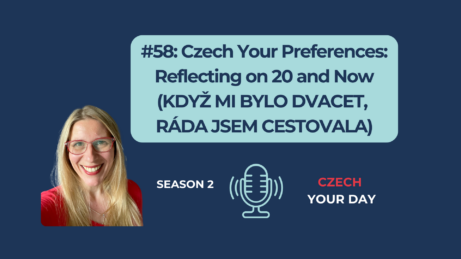Episode 35 (daily podcast CZECH YOUR DAY) transcript included

THIS WEEK’S TOPIC: WHAT TIME IS IT/KOLIK JE HODIN (part 2)
THE TRANSCRIPT/HANDOUT IS DOWN BELOW
Do you struggle with perfective and imperfective verbs in Czech? Then today’s story will help you a lot. Why? Seeing words in context is a powerful tool for understanding, so buckle up as we explore Renča’s typical day versus her plans for tomorrow.
Unlocking the Mystery: Renča’s Daily Routine
A glimpse into Renča’s day:
- Česky: Renča obvykle vstává ve čtvrt na pět, ale zítra ráno vstane ve tři čtvrtě na pět.
- English: Renča usually gets up at a quarter past four, but tomorrow morning, she will wake up at a quarter to five.
- Česky: Renča se každý den obléká ve tři čtvrtě na pět, ale zítra se oblékne ve čtvrt na šest.
- English: Renča gets dressed every day at a quarter to five, but tomorrow she will get dressed at a quarter past five.
- Česky: Renča obvykle snídá v šest hodin, ale zítra ráno se nasnídá ve čtvrt na sedm.
- English: Renča usually has breakfast at six o’clock, but tomorrow morning she’ll have breakfast at a quarter past six.
- Česky: Renča neodchází každý den do práce ve tři čtvrtě na osm. Zítra také neodejde, protože pracuje z domova.
- English: Renča doesn’t leave for work every day at a quarter to eight. Tomorrow she won’t either because she works from home.
- Česky: Renča si obvykle dělá kávu ve čtvrt na deset, ale zítra si udělá kávu ve tři čtvrtě na deset.
- English: Renča usually makes coffee at a quarter past nine, but tomorrow she’ll make it at a quarter to ten.
- Česky: Renča obvykle obědvá ve tři čtvrtě na dvanáct, ale zítra se naobědvá ve čtvrt na jednu.
- English: Renča usually has lunch at a quarter to twelve, but tomorrow she’ll have it at a quarter past twelve.
- Česky: Renča se obvykle vrací ze supermarketu ve čtvrt na tři, ale zítra se vrátí ve tři čtvrtě na čtyři. English: Renča usually returns from the supermarket at a quarter past two, but tomorrow she’ll return at a quarter to four.
- Česky: Renča má obvykle večeři ve čtvrt na sedm, ale zítra bude mít večeři ve čtvrt na šest.
- English: Renča typically has dinner at a quarter past six, but tomorrow she’ll have it at a quarter past five.
- Česky: Renča si obvykle čistí zuby ve čtvrt na devět, ale zítra si vyčistí zuby ve tři čtvrtě na devět. English: Renča usually brushes her teeth at a quarter past eight, but tomorrow she’ll do it at a quarter to nine.
- Česky: Renča obvykle chodí spát ve čtvrt na deset, ale zítra půjde spát ve tři čtvrtě na deset.
- English: Renča usually goes to bed at a quarter past nine, but tomorrow she’ll go to bed at a quarter to ten.
INFINITIVES:
vstávat x vstát
oblékat se x obléknout se
snídat x nasnídat se
odcházet x odejít
dělat si x udělat si
obědvat x naobědvat se
vracet se x vrátit se
čistit si x vyčistit si
chodit spát x jít spát
Komentáře








